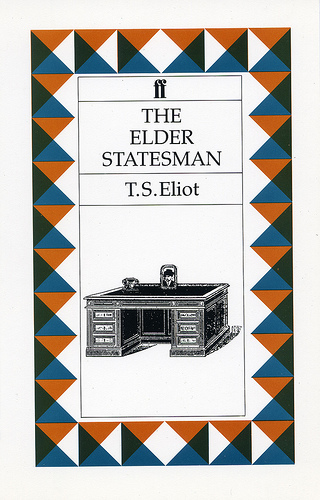
The fourth and final installment of this series looking at T.S. Eliot’s “The Elder Statesman” culminates in what is the decisive dialogue in the entire play. For previous installments click here, here, and here. By way of review, Lord Claverton has been pressured out of high office “for his health’s sake” and finds that his youthful indiscretions have resurfaced now in his retirement.
F or almost the entirety of the first two acts, Claverton is morosely resigned at the revelation of his past sins. He is given remarkable clarity at the folly of his life and the absurdity of the false self he fostered so closely. Yet it is not enough for Claverton to simply know what is wrong with himself. In the vacuum created by his suffering a new medicine must be prescribed which births freedom and love. For Eliot, such a medicine is found in the act of confession. This is what Claverton had to say:
or almost the entirety of the first two acts, Claverton is morosely resigned at the revelation of his past sins. He is given remarkable clarity at the folly of his life and the absurdity of the false self he fostered so closely. Yet it is not enough for Claverton to simply know what is wrong with himself. In the vacuum created by his suffering a new medicine must be prescribed which births freedom and love. For Eliot, such a medicine is found in the act of confession. This is what Claverton had to say:
I’ve made my confession to you, Monica:
That is the first step taken toward my freedom,
And perhaps the most important.
…
You think that I suffer from a morbid conscience,
From brooding over faults I might well have forgotten.
You think I’m sickening, when I’m just recovering!
It’s hard to make other people realize
The magnitude of things that appear to them petty;
It’s harder to confess the sin that no one believes in
Than the crime that everyone can appreciate.
For the crime is in relation to the law
And the sin is in relation to the sinner.
What has made the difference in the last five minutes
Is not the heinousness of my misdeeds
But the fact of my confession.
To a sufferer and a guilty conscience it is not enough to simply exhort them to get over their burden by lowering or redefining the standards. Though what Claverton did was not illegal, the immorality of his action pressed upon him all the more. Though we may try to tell ourselves that what we did isn’t all that bad, the fact that we have to tell ourselves anything betrays our efforts. On the flip side, this is not a confession borne of an artificial guilt. Claverton’s remorse is not imposed or forced upon him, rather it is the natural and tragic product of his life’s course.
Most importantly, Claverton’s plight demonstrates that the only way to move forward is to look backward and find absolution. One must dig deep enough into the well of their being and confess with un-tinted glasses the truth of themselves.
For Eliot, Confession brings to the front of one’s mind that which has been hidden. It is a naming of that which has a powerful hold of you. Love of the confessor (known as absolution) absorbs the power and threat of sin and returns in its place a word of forgiveness. It sees the sinner for who they are and loves them as though there were no sin. Consequently, our and Claverton’s lives are no longer defined by the heinousness of our misdeeds, but the fact of our confession. It is the happy exchange of good for evil, love and hope for despair.

COMMENTS
6 responses to “Confessions of an Elder Statesman – T.S. Eliot, Part 4 of 4”
Leave a Reply













Todd, this series has been incredible! In fact, as corny as it might sound, it's really ministered to me. Thank you.
Would you consider doing one for the cocktail party?
Thanks, dz. The cocktail party is probably Eliot's best work. I'll see what I can do!
Have you done of murderbin the cathedral?
Thank you for this series, Just re-reading this after many years (and as a much older person) – one of the critics said that Eliot used the word “love” in this play more than he used it in all of his other drama put together. That, perhaps, is the answer – love for others and for our own past and present selves.